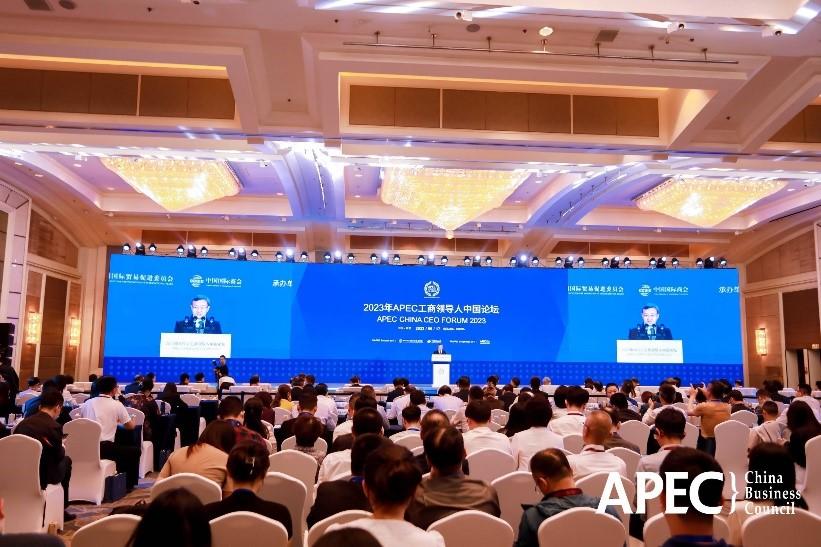APEC forum charts course for sustainable development in Asia-Pacific
- By Xu Xiaoxuan
 0 Comment(s)
0 Comment(s) Print
Print E-mail China.org.cn, June 19, 2023
E-mail China.org.cn, June 19, 2023

The APEC China CEO Forum 2023 is held in Beijing on June 17, 2023. [Photo courtesy of the organizing committee of the APEC China CEO Forum 2023]
The APEC China CEO Forum held Saturday in Beijing, a key communication platform under the APEC China Business Council, convened officials, business leaders, and experts to chart a course toward high-quality, sustainable development.
Over the past few decades, the Asia-Pacific Economic Cooperation (APEC) has been a significant catalyst for regional development, effectively enhancing people's well-being, noted Ren Hongbin, chairman of the China Council for the Promotion of International Trade and the China Chamber of International Commerce, both hosts of the forum.
According to the regional economic outlook released by the International Monetary Fund in May, the Asia-Pacific region's gross domestic product is projected to expand by 4.6% and contribute to approximately 70% of global growth in 2023.
Ren suggested that APEC should lead the way in sustainable development and facilitate green and low-carbon development in the Asia-Pacific region.
APEC has consistently advocated for establishing secure, open, stable and unimpeded regional industrial and supply chains, said Wang Shouwen, China international trade representative and vice minister of commerce. He affirmed that China would continue to support the trade of high-quality, high-tech and high value-added green and low-carbon products, promoting the green development of regional industrial and supply chains.
Zhao Chenxin, vice chairman of the National Development and Reform Commission, stated that amidst an increasingly complex international landscape, sustainable development had become the global consensus. He urged businesses to prioritize their role in innovation, suggesting that the APEC business community strengthen cooperation in an open manner and integrate sustainability into corporate growth strategies.
The focus on high-quality and sustainable development is an important aspect of APEC's work, said Rebecca Fatima Sta Maria, executive director of the APEC Secretariat. She applauded China's efforts to advance sustainable development, including improving air quality, promoting renewable energy, innovating green technologies, and committing to the United Nations' Sustainable Development Goals.
Monica Hardy Whaley, president of the National Center for APEC, highlighted the Bangkok Goals for a Bio-Circular-Green Economy, issued during last year's 29th APEC Economic Leaders' Meeting held in Thailand. She hailed the document as a groundbreaking agreement integrating sustainability into every facet of APEC's work.
Company representatives also shared their perspectives on promoting green and sustainable development.
Wang Xiangming, chairman of China Resources Group (CRC), touted technological innovation as a critical force for harmonizing humanity and nature. He introduced CRC's increased investment in scientific and technological innovation, robust recruitment of high-tech talent, and strengthened innovation cooperation with prestigious universities and scientific research institutions worldwide. These initiatives have led to remarkable outcomes in green transformation.
Hu Houkun, a rotating chairman of Huawei and a China member of the APEC Business Advisory Council, underscored the critical role that digital technologies can play in achieving green development. He mentioned that digital technologies could effectively cut energy projects' operation and maintenance costs and accelerate the energy structure's transformation.
Hu further noted that green development is a long-term undertaking that necessitates society-wide collaboration, with the business community playing a big role.
Industry experts shared measures to promote sustainability from various perspectives.
Guo Huadong, an academician of the Chinese Academy of Sciences and director general of the International Research Center of Big Data for Sustainable Development Goals, suggested using big data to track natural disasters, assess environmental indexes, and monitor the carbon neutrality process. He proposed establishing platforms to share data among APEC members to jointly advance high-quality development.
Wu Sheng, a proponent of the context methodology, recommended merging AI-generated content with low and zero-carbon application scenarios to transition to a circular economy.






Go to Forum >>0 Comment(s)